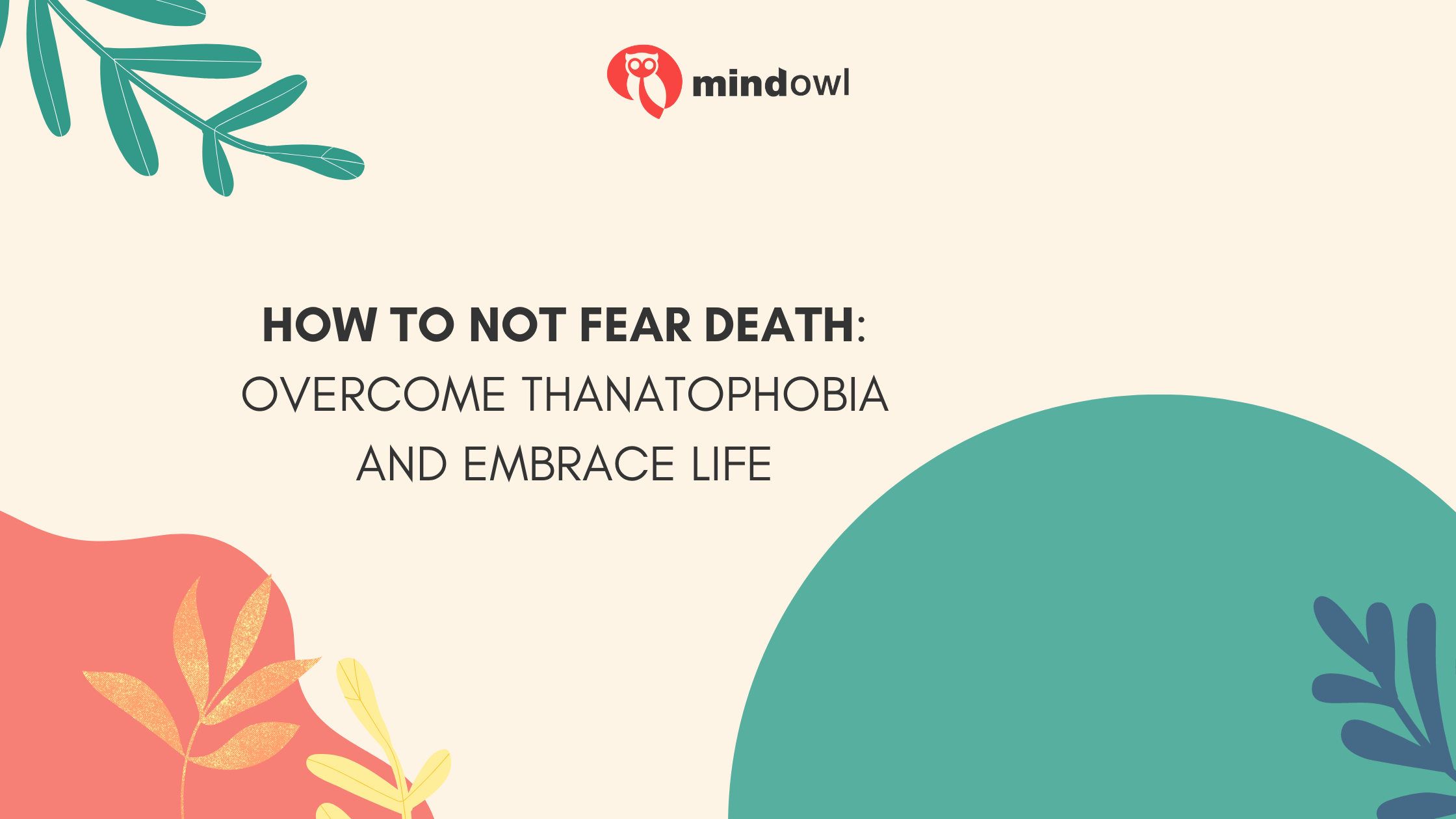Death is an inescapable part of the human experience, yet for many, the mere thought of it can trigger a deep-seated fear known as thanatophobia. This crippling anxiety can cast a shadow over our lives, robbing us of the ability to fully embrace the present moment and live with purpose and joy.
However, by confronting our fears head-on and cultivating a healthier perspective on mortality, we can break free from the shackles of thanatophobia and reclaim our zest for living.
In this article, we’ll explore practical strategies and philosophical insights to help you overcome the fear of death and embrace life with renewed vigour and appreciation.
Key Takeaways
- Overcoming thanatophobia means understanding it’s the intense fear of death, different from necrophobia which is a fear of dead things.
- Key strategies to manage this fear include exercise, meditation, talk therapy, and exposure therapy. Each has its own way of helping reduce anxiety related to death.
- Reflecting on life’s joys and embracing experiences positively can help in facing the fear of dying. Letting go of what you cannot control is essential for peace.
- Memento mori and considering the cosmic perspective encourage living fully by reminding us that our time is limited but valuable.
- Support from loved ones along with professional advice significantly aids in overcoming fears about death, leading to a more fulfilled life experience.
Understanding Thanatophobia
Definition of Thanatophobia
Thanatophobia is the fear of one’s own death or the process of dying. It brings feelings of anxiety, dread, and a strong desire to avoid anything that reminds one of death. This fear can interfere with daily life, making normal functioning difficult.
People with Thanatophobia may go out of their way to avoid discussions or thoughts about death.
This condition is more than just a worry; it affects individuals deeply, causing significant distress. Recognising Thanatophobia involves understanding this intense fear and how it manifests in avoidance behaviours and anxiety around the topic of one’s mortality.
Difference between Thanatophobia and Necrophobia
Thanatophobia is the intense fear of death. It makes people worry a lot about the inevitable fact that everyone will die one day. This fear can affect how someone feels every day, making them very anxious about dying.
On the other hand, necrophobia is different because it’s all about being scared of dead things or anything related to dying. For example, someone with necrophobia might feel terrified at funerals or when seeing a dead animal.
Both fears can cause a lot of stress and impact someone’s life greatly. However, they focus on different aspects of death and dying. Someone with thanatophobia fears the act and inevitability of death itself, while someone with necrophobia fears dead things and situations related to death.
Causes and Symptoms of Thanatophobia

Risk Factors
Understanding the risk factors linked to thanatophobia can help you feel less afraid and more in control. Here are some key factors that contribute to the development of thanatophobia:
- Personal experience with death – People who have witnessed the death of someone close may find themselves more likely to worry about death themselves. This can trigger thoughts of one’s own mortality.
- Mental health issues – Those with anxiety, depression, or other mental health disorders often face a higher risk. Their existing worries can extend to a fear of dying.
- Lack of information – Not knowing what happens after death scares many people. This fear often comes from a place of uncertainty and feeling unprepared for the inevitable.
- Ageing – As people get older, they naturally think more about their own life ending. This can lead to developing a fear of dying as they notice physical changes and face health challenges.
- Traumatic events – Someone who has lived through a near-death experience or a severe accident might develop thanatophobia due to the shock and trauma from those events.
- Cultural influences – Some cultures talk openly about death, while others treat it as a taboo subject. Growing up in an environment where death is feared rather than accepted as part of life may increase anxiety around it.
- Family attitudes towards death – If a family does not discuss or openly handle matters related to death, this lack of communication can make individuals feel more anxious about it.
Common Symptoms
Facing the fear of death, also known as thanatophobia, can manifest in various ways. Each symptom might touch a person’s life differently, from their mental state to their physical well-being. The common signs include:
- Anxiety that doesn’t go away – This feeling of unease or fear may linger, making everyday tasks seem more daunting.
- Trouble sleeping – Thoughts about death might keep you awake at night, leading to insomnia.
- Stomach issues – Worrying about death can upset your stomach, causing discomfort or even pain.
- Mood swings – You might feel fine one moment and deeply sad or angry the next.
- Irritability – Small annoyances become big problems when you’re constantly stressed about death.
- Fatigue – Constant worry can leave you feeling physically and mentally drained.
- Difficulty concentrating – Focusing on work or conversations becomes hard with death on your mind.
Strategies to Overcome Thanatophobia
Exercise and Meditation
Exercise and meditation are key strategies for overcoming thanatophobia. Engaging in physical activities boosts your mood and reduces anxiety. It’s well-known that regular exercise can make you feel happier, helping to lessen the fear of death.
Meditation, on the other hand, allows your mind to find peace and clarity. Through focusing on the present, you learn to let go of worries about life and death.
Epicurus, the Greek Philosopher, believed that living a good life means finding a balance between body and mind. This is where exercise and meditation come into play. They not only improve physical health but also encourage mental well-being by releasing stress and enhancing life satisfaction.
Talk Therapy and Support
Talk therapy and support play crucial roles in managing thanatophobia. Speaking to a mental health professional can open new pathways for understanding and coping with the fear of death.
This approach provides a safe space to express fears, doubts, and feelings. Trained therapists use methods like cognitive behavioral therapy (CBT) to challenge and change negative thoughts related to death.
Having support from people who care also makes a big difference. They listen, offer comfort, and share their perspectives on fear and anxiety about death. Together, these strategies help individuals face their fear with less dread, encouraging them to live more fully despite it.
Exposure Therapy
Exposure therapy can be a game-changer for people with thanatophobia. It gradually introduces them to their fears about death in a safe and controlled way. The idea is to make the thought of death less overwhelming.
Therapists might start with talking about death and slowly move on to more direct forms of confrontation, like visiting a cemetery. This type of therapy helps individuals face their fear head-on, teaching them that their anxiety can decrease over time.
Using techniques from exposure therapy also eases end-of-life fears, making it easier to manage thanatophobia. People learn coping strategies that help them think about death without panic or severe anxiety.
Over sessions, many find that they can talk about, think of, or even be around reminders of death with much less fear than before. This approach doesn’t just reduce fear; it often leads to a deeper appreciation for life and living fully in the present moment.
Philosophical reflection (memento mori, cosmic perspective)
Memento mori, a Latin phrase meaning “remember that you will die,” prompts us to contemplate our mortality. Reflecting on the briefness of life can motivate us to live more intentionally and appreciate each moment.
Conversely, considering the vastness of the cosmos offers perspective – we are merely specks in an infinite universe. This cosmic viewpoint invites us to embrace life fully, understanding that our existence is both fleeting and precious.

Embracing Life in the Face of Thanatophobia
Reflecting on Life
Life grants us incredible opportunities for joy and growth. Reflecting on life allows us to appreciate the beauty in simple moments, such as laughter with loved ones or a quiet sunrise.
It reminds us that time is precious and encourages us to make the most of every experience. Embracing each day with gratitude fosters a deeper sense of fulfilment and purpose, enriching our lives in profound ways.
Acknowledging life’s fleeting nature can help us seize its joys more fully. This awareness drives us to seek out adventures, connect with others authentically, and pursue our passions without hesitation – fostering a life well-spent and abundant with meaning.
Letting Go of What You Can’t Control
While death may be an inescapable reality, the fear of it often stems from our desire to control the uncontrollable. By acknowledging the limitations of our influence and letting go of what lies beyond our grasp, we can cultivate a sense of inner peace and acceptance.
Embrace the present moment, for it is the only thing truly within our power, and trust that the natural cycle of life will unfold as it should.
Living Life to the Fullest
Embracing life means savouring every moment, cherishing the beauty in the ordinary, and pursuing your passions with unwavering determination. When we shift our focus from the inevitability of death to the richness of the present, we unlock a profound sense of purpose and gratitude.
Engage in activities that ignite your soul, forge meaningful connections, and create lasting memories – for these are the threads that weave the tapestry of a life well-lived.
Conclusion
Overcoming the fear of death is possible through small steps like exercise and talking about your fears. Seeking professional help can make a significant difference in managing thanatophobia.
Embracing life despite the fear of death involves reflecting on what you can control and living each day to the fullest. It’s crucial to remember that acceptance of death doesn’t mean giving up on life, but rather finding peace and making the most of every moment.
FAQs
1. What is thanatophobia, and why do I fear death so much?
Thanatophobia is the intense fear of death or dying, often leading to anxiety when thinking about the end of life. People are more likely to develop this fear from intrusive thoughts about death or after experiencing the loss of a loved one.
2. Can talking about my fear of death help me overcome it?
Absolutely! Conversations about death with someone you trust can be incredibly therapeutic. It helps you face your fears and could reduce anxious thoughts, making for a happier life.
3. How does avoiding talk about death affect us?
Avoiding discussions on the topic can make our fears worse, leading to increased anxiety and even depressive disorders. Facing these conversations head-on allows us to process our feelings more healthily.
4. Are there professional ways to get over my fear of dying?
Yes – seeking treatment from a licensed mental health professional can offer significant relief. They provide strategies tailored specifically for you, helping manage your fears in a supportive environment.
5. Does fearing death mean I have a psychological disorder?
Not necessarily; while extreme cases might be linked with generalised anxiety or hypochondriasis, most people who struggle with this fear don’t have an underlying disorder. However, if your life is severely impacted, it’s wise to seek professional help.
6. How can embracing the joys of life help me overcome my fear of death?
Focusing on living well—enjoying relationships, pursuing passions—can shift your focus away from fearing the end and towards making every moment count. Many find peace in realising that without death, we wouldn’t cherish life as much.
MindOwl Founder – My own struggles in life have led me to this path of understanding the human condition. I graduated with a bachelor’s degree in philosophy before completing a master’s degree in psychology at Regent’s University London. I then completed a postgraduate diploma in philosophical counselling before being trained in ACT (Acceptance and commitment therapy).
I’ve spent the last eight years studying the encounter of meditative practices with modern psychology.

